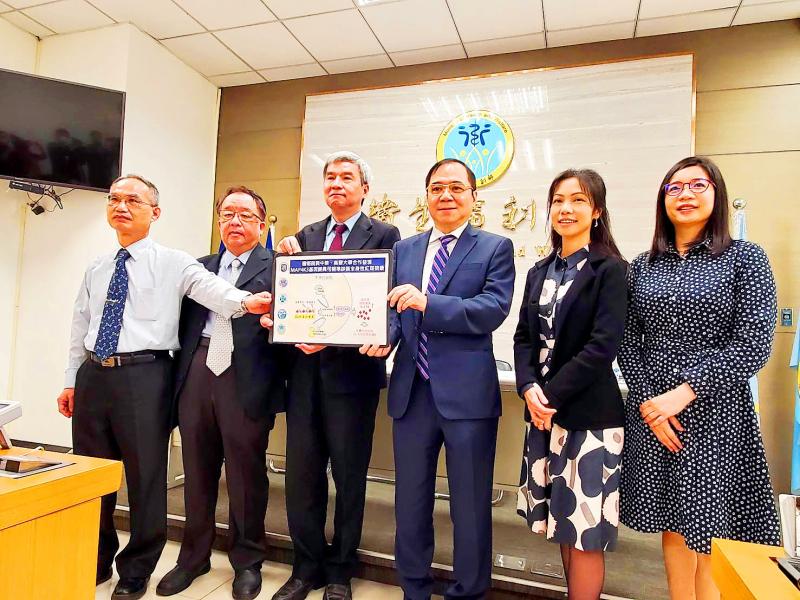A National Health Research Institutes (NHRI) team has discovered a biomarker that could help in diagnosing the most common type of lupus earlier on, the institute said yesterday.
The group, comprised of researchers and physicians from the NHRI, Taichung Veterans General Hospital and Kaohsiung Medical University Hospital, identified several germline and somatic variants of the protein coding gene MAP4K3, also known as GLK, which can cause an overexpression of the gene in T cells, and is associated with a higher risk of developing systemic lupus erythematosus (SLE).
NHRI assistant research fellow Chuang Huai-chia (莊懷佳) said that SLE is a chronic, complex and systemic autoimmune disease that can damage multiple organs, with about 90 percent of cases occurring in women, but as each patient can have different symptoms, the disease is often difficult to diagnose early.

Photo: Lin Hui-chin, Taipei Times
A team, led by NHRI Immunology Research Center Distinguished Investigator Tan Tse-hua (譚澤華), began studying the cause and the precise biomarkers of SLE in 2009.
In 2011, they discovered that GLK, which can regulate immune inflammation responses, plays a key role in developing SLE.
They later found that GLK overexpression induces interleukin-17A production and autoimmune responses, but the mechanism of GLK overexpression in people with SLE remained unclear.
They teamed up with Taichung Veterans General Hospital and Kaohsiung Medical University Hospital to collect 431 genomic DNA samples from people who did not have SLE, and people with SLE and their family members, for next-generation sequencing.
Chuang said they found that more than 40 percent of the people with SLE have GLK germline and somatic variants, and some of the GLK overexpression induced by the variants, through the stabilization of GLK mRNAs or proteins, might be involved in the development of SLE.
The team is also the first to find that the novel E3 ligase makorin ring-finger protein 4 (MKRN4), a putative ubiquitin-protein E3 ligase, which was thought to be a pseudogene, can induce GLK protein degradation, and that downregulation and mutation of MKRN4 might also lead to GLK overexpression and subsequent induction of autoimmune responses, she said.
Tan said the findings suggest that if female family members of people with the specific GLK germline and somatic variants receive regular genetic testing, they are more likely to be diagnosed with SLE early and receive treatment.
He said the team has developed a screening kit, for which they are applying for a patent, and it is expected to be used clinically within two years.
Their research was published in the Annals of the Rheumatic Diseases last month.

The disruption of 941 flights in and out of Taiwan due to China’s large-scale military exercises was no accident, but rather the result of a “quasi-blockade” used to simulate creating the air and sea routes needed for an amphibious landing, a military expert said. The disruptions occurred on Tuesday and lasted about 10 hours as China conducted live-fire drills in the Taiwan Strait. The Civil Aviation Administration (CAA) said the exercises affected 857 international flights and 84 domestic flights, affecting more than 100,000 travelers. Su Tzu-yun (蘇紫雲), a research fellow at the government-sponsored Institute for National Defense and Security Research, said the air

Taiwan is to commence mass production of the Tien Kung (天弓, “Sky Bow”) III, IV and V missiles by the second quarter of this year if the legislature approves the government’s NT$1.25 trillion (US$39.78 billion) special defense budget, an official said yesterday. Commenting on condition of anonymity, a defense official with knowledge of the matter said that the advanced systems are expected to provide crucial capabilities against ballistic and cruise missiles for the proposed “T-Dome,” an advanced, multi-layered air defense network. The Tien Kung III is an air defense missile with a maximum interception altitude of 35km. The Tien Kung IV and V

Trips for more than 100,000 international and domestic air travelers could be disrupted as China launches a military exercise around Taiwan today, Taiwan’s Civil Aviation Administration (CAA) said yesterday. The exercise could affect nearly 900 flights scheduled to enter the Taipei Flight Information Region (FIR) during the exercise window, it added. A notice issued by the Chinese Civil Aviation Administration showed there would be seven temporary zones around the Taiwan Strait which would be used for live-fire exercises, lasting from 8am to 6pm today. All aircraft are prohibited from entering during exercise, it says. Taipei FIR has 14 international air routes and

Taiwan lacks effective and cost-efficient armaments to intercept rockets, making the planned “T-Dome” interception system necessary, two experts said on Tuesday. The concerns were raised after China’s military fired two waves of rockets during live-fire drills around Taiwan on Tuesday, part of two-day exercises code-named “Justice Mission 2025.” The first wave involved 17 rockets launched at 9am from Pingtan in China’s Fujian Province, according to Lieutenant General Hsieh Jih-sheng (謝日升) of the Office of the Deputy Chief of the General Staff for Intelligence at the Ministry of National Defense. Those rockets landed 70 nautical miles (129.6km) northeast of Keelung without flying over Taiwan,